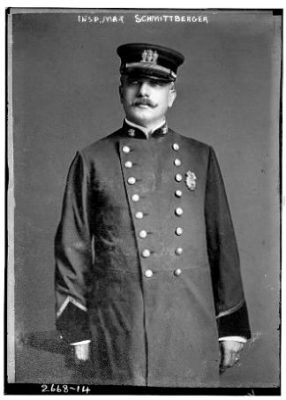 Max F. Schmittberger, July 27, 1851 – October 31, 1917, was born in Würzburg in the Kingdom of Bavaria on July 27, 1851. Four years after his birth, his family emigrated to the United States and settled in Harlem, NY. He was educated in public schools and was employed in two or three other occupations prior to joining the Municipal Police Department on January 8, 1874. He reportedly had “a quiet demeanor and dislike of publicity”, traits which he held from his days as a patrolman until his last days on the force. He gradually rose through the ranks becoming a roundsman on April 2, 1880, a sergeant on March 6, 1883, and a captain on December 8, 1890.
Max F. Schmittberger, July 27, 1851 – October 31, 1917, was born in Würzburg in the Kingdom of Bavaria on July 27, 1851. Four years after his birth, his family emigrated to the United States and settled in Harlem, NY. He was educated in public schools and was employed in two or three other occupations prior to joining the Municipal Police Department on January 8, 1874. He reportedly had “a quiet demeanor and dislike of publicity”, traits which he held from his days as a patrolman until his last days on the force. He gradually rose through the ranks becoming a roundsman on April 2, 1880, a sergeant on March 6, 1883, and a captain on December 8, 1890.
He was assigned to the “Broadway squad” during the 1870s and 1880s where he and John Price became closely associated with the then head of the Tenderloin district Captain Alexander “Clubber” Williams. Schmittberger later testified before the Lexow Committee, agreeing to turn state’s evidence, and implicated a number of high-level police officials involved in police corruption. Among these officials included Williams, now a police inspector, who Schmittberger claimed he had collected bribe money from gambling resorts and brothels, amounting to between $180–200 a month, then turning the money over to Williams. He also claimed to have carried out similar activity during his involvement was the “steamboat squad” and in other posts. Theodore Roosevelt was the city’s police commissioner. The two men and their families were friends. Schmittberger was the only police official to emerge unscathed from the Lexow inquiry, his former colleagues either allowed to retire or were dismissed from the force, and was called a “squealer” by members of the NYPD.
The police work in the spring of 1901 was under the direction of Max F. Schmittberger, the Captain of the Precinct at West 100th Street, located then on the south side of the street near Columbus Avenue.This was the same man who had “squealed” in his testimony to the Lexow Commission in 1894 against the higher-ups in the Department. Many of the New York “reformers” held the Captain up as a man who had seen the error of his ways—indeed a bit of a hero against corruption. His detractors in the Police Department said that he worked it both ways throughout his career, sometimes taking bribes, sometimes not. When he was promoted to Inspector, Schmittberger faced great criticism as an admittedly former corrupt officer, but he was promoted anyway. Schmittberger was the only police official to emerge unscathed from the Lexow inquiry, his former colleagues either allowed to retire or were dismissed from the force, and was called a “squealer” by members of the NYPD.
While a Democratic Party Tammany-controlled administration was in power from 1897 to 1901, the police appeared willing to work with the “reformers” of the Upper West Side who seemed more interested in their property values than the immorality of Little Coney Island. The Police Commissioner was quoted in March 1901 that he was determined to crush the dance halls at any cost, and was happy with Schmittberger’s Sunday raids. He said he’d received letters from parents who were concerned about their daughters and sons going to the dance halls. Commissioner Murphy was hauled into court himself for his continuing pursuit of Waldron, angering the Magistrate at the West Side Police Court, as to how the police were doing their jobs.
After 1902, all news reports of the raids on 110th Street ceased. The next phase of property development began, and the wooden structures on 110th Street were eventually sold for the increasingly profitable land. By 1910, developers had constructed the solid apartment buildings we still have today.
Later, in 1906, the police department tried to pursue him for corruption again, after transferring him to Staten Island as a punishment. He was never convicted of any crimes, and, when he died in 1917, he had a magnificent funeral at St. Patrick’s Cathedral.
Related articles
- Case Of Legionnaires’ Disease In The Harlem Sparks Alerts (harlemworldmag.com)
Become a Harlem Insider!
By submitting this form, you are consenting to receive marketing emails from: . You can revoke your consent to receive emails at any time by using the SafeUnsubscribe® link, found at the bottom of every email. Emails are serviced by Constant Contact








